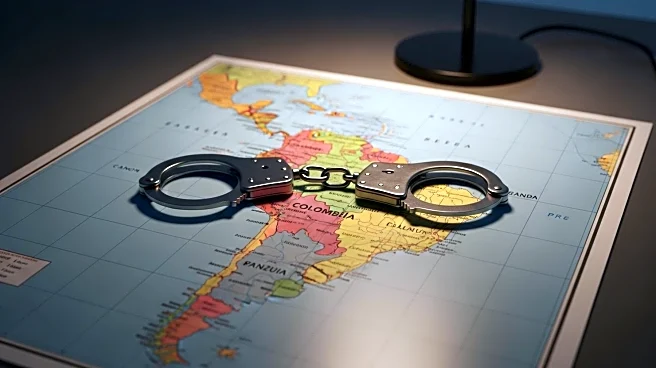What's Happening?
Colombian authorities, in collaboration with the United States and the United Kingdom, have arrested José Antonio Márquez Morales, a senior member of the Venezuelan criminal gang Tren de Aragua. Known by the alias 'Caracas,' Márquez Morales was apprehended in Valledupar, Colombia. He is alleged to have played a significant role in managing the gang's logistics and finances, which include activities such as extortion, drug trafficking, and smuggling. The arrest was facilitated by an Interpol Red Notice, which is a request for law enforcement worldwide to locate and provisionally arrest an individual pending extradition. This development comes amid ongoing tensions between the United States and Venezuela, particularly concerning the Trump administration's efforts to combat drug trafficking in Latin America.
Why It's Important?
The arrest of José Antonio Márquez Morales is a significant development in the international fight against organized crime and drug trafficking. Tren de Aragua has been a target of the Trump administration, which has labeled it a terrorist organization. The gang's activities have been linked to broader geopolitical tensions, as the U.S. has accused Venezuelan President Nicolás Maduro of collaborating with drug cartels. The capture of a key figure in the gang could potentially disrupt its operations and weaken its influence in the region. This arrest also underscores the importance of international cooperation in addressing transnational criminal activities, as evidenced by the joint efforts of Colombia, the U.S., and the U.K.
What's Next?
Following the arrest, José Antonio Márquez Morales may face extradition proceedings, potentially to the United States, where he could be tried for his alleged crimes. The U.S. has been actively pursuing members of Tren de Aragua as part of its broader strategy to combat drug trafficking originating from Venezuela. The arrest may also lead to further investigations and arrests of other gang members, as authorities continue to dismantle the organization's network. Additionally, this development could influence U.S.-Venezuela relations, particularly if it leads to increased pressure on President Maduro's government.
Beyond the Headlines
The arrest highlights the complex interplay between organized crime and international politics. The Trump administration's aggressive stance against Venezuelan drug trafficking has included military actions, such as deploying warships to the Caribbean and targeting vessels suspected of carrying drugs. These actions have been part of a broader strategy to curb the influence of criminal organizations in the region. The situation also raises questions about the effectiveness of such strategies and the potential for unintended consequences, such as escalating tensions between the U.S. and Venezuela.










